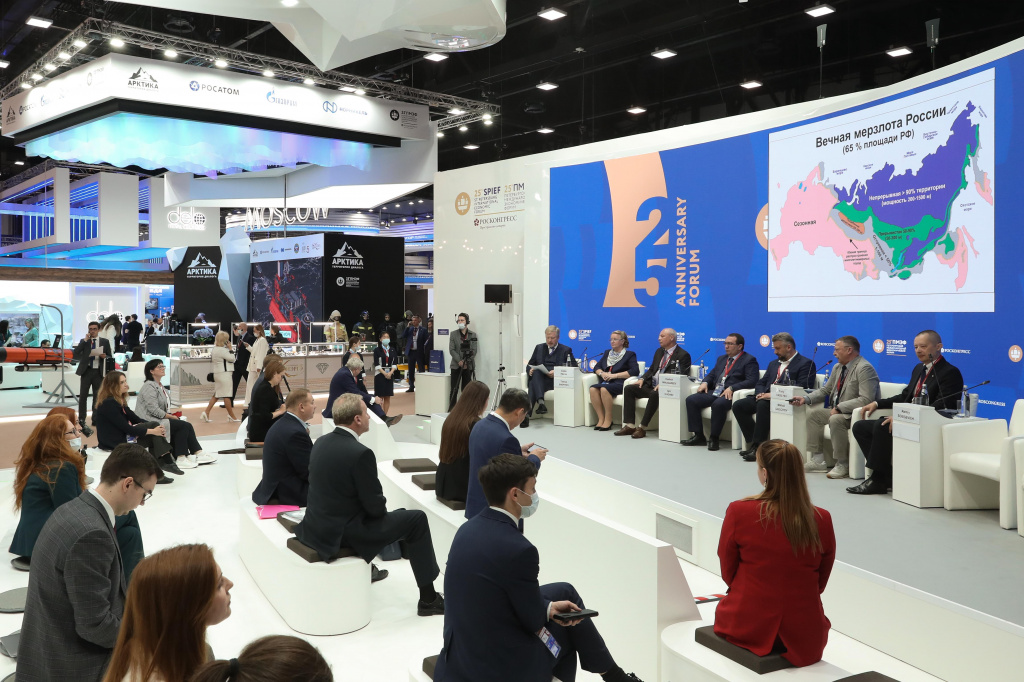
RGS Experts Discuss Role of Science in Strategic Arctic Solutions at SPIEF
On 16 June 2022, at the 25th St. Petersburg International Economic Forum, experts and partners of the Russian Geographical Society discussed the role of science in strategic solutions pertaining to human activity in the Arctic zone. The ‘Science and Strategic Solutions in the Arctic’ session kicked off the three-day ‘Arctic: Territory of Dialogue’ business programme at the booth of the Ministry for the Development of the Russian Far East and Arctic.
The discussion focused on environmental and business risks associated with expanding into the Arctic and developing industry there. Each speaker touched on the threats posed by unprepared expansion to the Arctic ecosystem from the perspective of his or her own field of study. Business activity carried out in the absence of properly executed advance scientific reports harm the environment and risk causing setbacks to major investment projects and wasting time and money. The Russian Geographical Society integrates the developments of academic institutions, providing the companies responsible with the data needed to make decisions for the sustainable development of the Arctic and their own businesses.
During the session, Director of the Institute of Roads, Building and Structures of the Russian University of Transport Taisiya Shepitko spoke of the need to extend scientific support for transport infrastructure facilities being designed and built and for those already in place. She stressed that the funds needed for the scientific support that precedes construction of any kind was less than that required to monitor existing facilities. “A comprehensive and innovative approach is needed for science, business, industry, and the regional authorities to work together. For example, over the course of four expeditions in 2019–2021, we laid a geomonitoring network together with the Russian Geographical Society to monitor the condition of soils along the entire length of the Northern Latitudinal Railway, a railway line planned to extend to Norilsk and Dudinka and doubling up the Northern Sea Route. Together the routes will create a reliable transport system,” Shepitko said.
Director of the Zubov State Oceanographic Institute Igor Ivachev listed examples of specific projects commissioned by business to illustrate the high level of risk associated with working in the Arctic zone. “We work in all of Russia’s seas and can say that those in the Arctic are always difficult. The hydrometeorological conditions are especially harsh. Without a system of marine retrospective observations and continuous monitoring, it is impossible to build a predictive model of optimal exploitation for the Northern Sea Route, and the well-being of many businesses depends upon it,” Ivachev said. “We have amassed invaluable experience through continuous research together with Russian Geological Society expeditions. Some have been conducted on Franz Josef Land and Iturup, and we only just returned from Russky Island.”
Deputy Director of Research at the Melnikov Institute of Permafrost of the Siberian Branch of the Russian Academy of Sciences Mikhail Grigoriev spoke of the importance of continuity in scientific research from a monitoring perspective as well as for training personnel. “Thanks to your expeditions – complex, expensive, equipped with helicopters and naval vessels – we are able to make professional researchers out of young scientists,” Grigoriev said, addressing representatives of the Russian Geographical Society.
Deputy Director of Research at the Fedorov Institute of Applied Geophysics Vladimir Minligareev talked about the need to monitor the upper geosphere. “Space weather and changes in the Earth’s geomagnetic pole – it is moving towards Taymyr – affect the state of the Arctic more than human activity. It is all the more important to monitor solar activity in anticipation of its expected peak in 2025,” Minligareev said. “There are many examples in the history of the twentieth century of increased activity disrupting sophisticated instruments and paralysing entire industries. During an expedition with the Russian Geographical Society in April 2020, we managed to make a discovery of global interest: we were able to determine the exact position of the Earth’s south magnetic pole. With this groundwork already laid, we will continue our research in the Russian Arctic.”
Deputy Director of Research and Chief Scientist at the Schmidt Institute of Earth Physics of the Russian Academy of Sciences Alexey Sobisevich stressed the importance of geophysical monitoring. “The situation needs to be monitored dynamically. For example, a recent joint Arctic-archipelago expedition with the Russian Geographical Society to the tiny island of Belukha off the coast of Taymyr revealed new seismic activity. A network of seismological observation stations can monitor areas of high activity ahead of time to prevent possible risks.”
Wrapping up the discussion was Yuri Vasiliev, Executive Director of the Institute of Arctic Technologies at the Moscow Institute of Physics and Technology, who spoke about plans to build the world’s first autonomous hydrogen-powered science and education complex, to be known as Snezhinka. One of the primary goals of the project is to demonstrate the potential of Arctic hydrogen energy. The second objective is to establish interaction between industry and applied science. This international Arctic research and infrastructure project was previously presented to the President of the Russian Federation, Vladimir Putin. Snezhinka consists of a group of testing grounds for the launch of new technologies,” Vasiliev said.
According to Vasiliev, the Snezhinka project has been endorsed by Arctic Council member states and has been introduced into the Arctic Council’s Sustainable Development Working Group.
“In June 2020, all the Arctic countries at the Arctic Council working group session took part in an open vote, and it was unanimously supported by all. Norway officially became a partner country in the project, with the rest of the countries joining in working order,” he said.
Historically, the Russian Geographical Society has contributed to the study of the Arctic by integrating large-scale initiatives for the development of the Arctic region. These include research work involving projects under the auspices of leading Russian scientists to study the geophysical and hydrological processes of Arctic ecosystems. In addition, the Russian Geographical Society conducts environmental safety activities, which include environmental monitoring and cleanup jobs of technogenic pollution in the area. Basic scientific research provides a sound basis for strategic decisions on man’s presence in the region and to address social, economic, and infrastructural challenges in Russia’s Arctic zone.
Russia holds the chairmanship of the Arctic Council from 2021 to 2023. A cross-cutting priority of the Russian Chairmanship is to ensure responsible governance for the sustainable development of the Arctic. Russia intends to promote collective approaches based on respect for international law to balanced social, economic, and environmental development of the polar regions. Operating the main events of Russia’s Arctic Council chairmanship is the Roscongress Foundation.
Reference information:
Official social media accounts of Russia’s chairmanship in the Arctic Council:
VKontakte: vk.com/arctic_on
Twitter: twitter.com/ArcticON1
Telegram: t.me/arcticonofficial
Weibo: weibo.com/u/7728847725
WeChat ID: arcticonofficial








